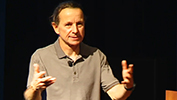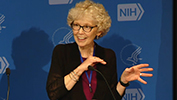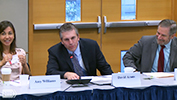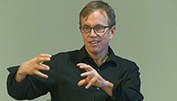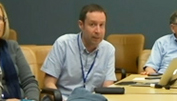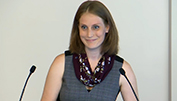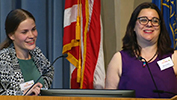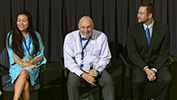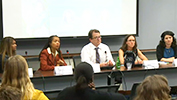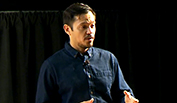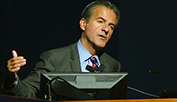-
- NIH VideoCast - Reverse Engineering Primate Visual Object Perception
-
- - James DiCarlo, M.D., Ph.D., MIT (2017/10/03)
- - Category : Neuroscience
- NIH Neuroscience Series Seminar
The research goal of Dr. DiCarlo`s laboratory is to understand the mechanisms underlying visual object recognition. Specifically they seek to understand how sensory input is transformed by the brain from an initial representation (essentially a photograph on the retina), to a new, remarkably powerful form of representation -- one that can support our seemingly effortless ability to solve the computationally difficult problem of object recognition. They are particularly focused on patterns of neuronal activity in the highest levels of the ventral visual stream (primate inferior temporal cortex, IT) that likely directly underlie recognition. At these high levels, individual neurons can have the remarkable response property of being highly selective for object identity, even though each object???s image on the retinal surface is highly variable -- for example, due to changes in object position, distance, pose, lighting and background clutter. Understanding the creation of such neuronal responses by transformations carried out along the ventral visual processing stream is the key to understanding visual recognition.
To approach these very difficult problems, the work of their laboratory is directed along three main lines: 1) characterize the computational usefulness of patterns of IT neuronal activity for supporting immediate visual object recognition, 2) test and develop computational theories of how visual input is transformed along the ventral processing stream from a pixel-wise representation, to a powerful representation in IT, 3) understand the spatial organization of this representation. Their primary research approaches are: neurophysiology in awake, behaving non-human primates, functional brain imaging (fMRI), human psychophysics, and computational modeling. Across all of these endeavors they aim to develop innovative methods and tools to facilitate this work in their laboratory and others. Their approaches are often synergistic with those of other MIT laboratories, and this has greatly enhanced their progress.
For more information go to https://neuroscience.nih.gov/neuroseries/Home.aspx
NIH VideoCast - Reverse Engineering Primate Visual Object Perception
-
- NIH VideoCast - Turning Discovery into Health: The Contributions of Economic Research (Day 1)
-
- - NIH (2017/09/30)
- - Category : Advisory Board Meetings and Workshops
- The Health Economics Common Fund Program at the National Institutes of Health (NIH) has supported research to understand how innovations in treatments, diagnosis, and preventive strategies can be most effectively deployed to improve health and well-being. Research supported by this program identifies factors determining adoption of effective health technologies, innovations, and discoveries, so that past and future investments by NIH may have greater public health impact.
In recognition of its last year, the Health Economics Common Fund Program is sponsoring a research symposium titled Turning Discovery into Health: The Contributions of Economic Research on September 28-29, 2017 on the NIH Main Campus. The goals of this program-culminating event are to highlight results from Common Fund supported projects and to stimulate ideas for future contributions of economic methods to the NIH and Institute-specific missions.
For more information go to http://www.roseliassociates.com/HealthEcon2017
NIH VideoCast - Turning Discovery into Health: The Contributions of Economic Research (Day 1)
-
- NIH VideoCast - National Advisory Council on Aging (NACA) - September 2017
-
- - NIA, NIH (2017/09/29)
- - Category : Advisory Board Meetings and Workshops
- The National Advisory Council on Aging (NACA) advises the Secretary of the U.S. Department of Health and Human Services, the Director of NIH, and the Director of NIA on it`s mission. The Council meets three times a year to consider applications for research and training.
NIH VideoCast - National Advisory Council on Aging (NACA) - September 2017
-
- NIH VideoCast - CC Grand Rounds: Human Factors Engineering and the Science of Safety in Healthcare
-
- - Rollin J. (Terry) Fairbanks, MD, MS Founding Director, National Center for Human Factors in Healthcare, MedStar Institute for Innovation?? Assistant Vice President Ambulatory Quality & Safety, MedStar Health?? Co-Director, MedStar Telehealth Innovation Center, MedStar Institute for Innovation; Associate Professor of Emergency Medicine, Georgetown University (2017/09/29)
- - Category : Clinical Center Grand Rounds
- CC Grand Rounds: Human Factors Engineering and the Science of Safety in Healthcare
For more information go to http://www.cc.nih.gov/about/news/grcurrent.html
NIH VideoCast - CC Grand Rounds: Human Factors Engineering and the Science of Safety in Healthcare
-
- NIH VideoCast - Mechanisms of self versus non-self discrimination in the innate immune system
-
- - Greg Barton, Ph.D., Endowed Chair and Professor of Immunology and Pathogenesis, UC Berkeley (2017/09/29)
- - Category : Immunology
- Immunology Interest Group Seminar Series
Greg Barton received his undergraduate degree from Princeton University. He performed his graduate work in the lab of Alexander Rudensky at the University of Washington and his postdoctoral training with Ruslan Medzhitov at Yale University. He joined the faculty at Berkeley in 2005. Dr Barton currently holds the position of Endowed Chair and Professor of Immunology and Pathogenesis at UC Berkeley. The Barton Lab studies innate immunity with the goal of understanding strategies of pathogen recognition and self/non-self discrimination.
NIH VideoCast - Mechanisms of self versus non-self discrimination in the innate immune system
-
- NIH VideoCast - Biophysics and Biology of K+ Channels
-
- - Roderick MacKinnon, M.D., Nobel Prize in Chemistry 2003, John D. Rockefeller Jr. Professor, Investigator, Howard Hughes Medical Institute, Rockefeller University (2017/09/29)
- - Category : WALS - Wednesday Afternoon Lectures
- NIH Director`s Wednesday Afternoon Lecture Series
Ion channels catalyze the diffusion of inorganic ions down their electrochemical gradients across cell membranes. Because the ionic movements are passive, ion channels would seem to be extraordinarily simple physical systems, yet they are responsible for electrical signaling in living cells. Among their many functions, ion channels control the pace of the heart, regulate the secretion of hormones into the bloodstream, and generate the electrical impulses underlying information transfer in the nervous system.
Dr. MacKinnon`s research is aimed at understanding the physical and chemical principles underlying ion channel function.
For more information go to https://oir.nih.gov/wals/2017-2018/biophysics-biology-channels
NIH VideoCast - Biophysics and Biology of K+ Channels
-
- NIH VideoCast - Workshop on Translational Challenges of Induced Pluripotent Stem Cells
-
- - NCATS, NIH (2017/09/28)
- - Category : Conferences
- The discovery of induced pluripotent stem cells (iPSCs) more than a decade ago has transformed stem cell biology and biomedical research in such fields as disease modeling, drug discovery, predictive toxicology and regenerative medicine applications. To bring iPSC-based therapies more efficiently to patients, it is pivotal to continue addressing the key knowledge gaps and roadblocks in a coordinated multidisciplinary fashion. This workshop will focus on defining the collaborative opportunities, challenges and best practices in translational iPSC research. Topics of interest are quality control standards for pluripotency, safety, experimental reproducibility, cost-efficient scalability and manufacturing, improved and efficient differentiation protocols, advances in -omics and functional characterization of cell-type identities, and other relevant questions. As a deliverable of the workshop, the gathered information and recommendations will help to draft a white paper for the translational stem cell community.
NIH VideoCast - Workshop on Translational Challenges of Induced Pluripotent Stem Cells
-
- NIH VideoCast - Ethical and Regulatory Aspects of Clinical Research Session 1: History and Framework for Ethical Clinical Research
-
- - Christine Grady RN PhD, NIH, Susan E. Lederer PhD, University of Wisconsin and Rebecca Dresser JD, Washington University School of Law (2017/09/28)
- - Category : Bioethics
- The Department of Bioethics offers this seven to eight week course annually each fall. The course is designed to provide an overview of the important issues in the ethics of human subject research for clinical investigators and others who participate in the conduct of research and is open to the entire NIH community as well as to those from outside NIH. Topics include the history of human subject research ethics, principles and guidelines, study design, subject recruitment, informed consent, and international research. The course is open to the entire NIH community as well as to those from outside NIH. The recommended textbook is Ethical and Regulatory Aspects of Clinical Research, edited by Emanuel et al (Johns Hopkins University Press). The course is taught by guest faculty and faculty members from the National Institutes of Health. This is a required academic program for Bioethics fellows.
NIH VideoCast - Ethical and Regulatory Aspects of Clinical Research Session 1: History and Framework for Ethical Clinical Research
-
- NIH VideoCast - NCI Council of Research Advocates Meeting - September 2017
-
- - Office of Advocacy Relations, NCI, NIH (2017/09/27)
- - Category : Advisory Board Meetings and Workshops
- The NCRA will meet to identify and respond to issues facing the Institute and the cancer research community.
NIH VideoCast - NCI Council of Research Advocates Meeting - September 2017
-
- NIH VideoCast - Short-term synaptic plasticity
-
- - Wade Regehr, Ph.D., Professor of Neurobiology, Harvard University (2017/09/27)
- - Category : Neuroscience
- NIH Neuroscience Series Seminar
Dr. Regehr lab???s long-term goal is to determine how presynaptic neurons influence the firing of their targets and to understand how physiologically significant computations are performed by synapses. Fast chemical synapses are the primary means of communication between neurons. They are constantly modified by a variety of mechanisms in ways that are vital to memory formation and normal brain function. With calcium implicated in almost every aspect of transmission, their focus has been on the many basic questions regarding calcium control of synaptic strength in the mammalian brain.
It is clear that many calcium dependent processes work together to control the release of neurotransmitter. These include synaptic facilitation, chemical messenger mediated release, depression and delayed release of neurotransmitter. Dr. Regehr???s strategy has been to examine each of these mechanisms in isolation and then to determine how they interact to control synapses during realistic spike trains. Most of the studies have been performed on synapses in the cerebellum, which are well described anatomically, accessible and relatively easy to study. To explore the physiological relevance of various aspects of synaptic transmission they have recently started to study the synapse between retinal ganglion cells and thalamic relay neurons. In future years the primary experimental approaches will remain imaging of ionic levels within cells and electrophysiological measurements. It is anticipated, however, that these approaches will be augmented by 2-photon imaging with molecularly engineered indicators based on GFP.
For more information go to https://neuroscience.nih.gov/neuroseries/Home.aspx
NIH VideoCast - Short-term synaptic plasticity
-
- NIH VideoCast - TRACO 2017 - Ovarian Cancer in the Genomics Era and Immune checkpoints
-
- - Christina M. Annunziata, MD, PhD, NCI, NIH and Stephanie L. Goff, M.D., NCI, NIH (2017/09/27)
- - Category : TRACO
- Translational Research in Clinical Oncology (TRACO)
Recent advances in understanding cancer biology are beginning to be translated into improvements in diagnosis and treatment of cancer. In the post-genome era, we increasingly rely on strong collaboration between basic and clinical scientists to develop novel approaches for treatment of human disease. The NCI Center for Cancer Research (CCR) is one of the largest cancer research organizations in the world, with more than 200 principal investigators, and has played a major role in developing and implementing many new technologies, such as nanotechnology, next generation sequencing, genomics and proteomics.
For more information go to http://ccr.cancer.gov/trainee-resources-courses-workshops-traco
NIH VideoCast - TRACO 2017 - Ovarian Cancer in the Genomics Era and Immune checkpoints
-
- NIH VideoCast - Genome Organization Drives Chromosome Fragility
-
- - Dr. Andres Canela, NCI, NIH (2017/09/22)
- - Category : DNA Repair
- DNA repair videoconference
NIH VideoCast - Genome Organization Drives Chromosome Fragility
-
- NIH VideoCast - Federal Training Institute Partnership: The Millennial Riddle
-
- - Dr. Patrick S. Malone, Director, Key Executive Leadership Programs, Department of Public Administration and Policy, American University (2017/09/22)
- - Category : Diversity
- Federal Training Institute Partnership
The Millennial Riddle. Maladjusted, Misaligned, Maddening, Nah???. they are Millennials, and they bring a deep passion and commitment to the work they do in the Federal Government. So, what is the secret to tapping into the hearts and minds of this talented workforce? It begins with understanding what they seek, and then connecting with them in a meaningful and authentic way. This session explores strategies to make this happen and practical ideas to harness Millennials, and drive organizational success. This workshop is part of a two-day 2017 Federal Training Institute Partnership, a public non-profit partnership in collaboration with HHS HR Talent Acquisition Division, NIH Equity Diversity and Inclusion, Federal Agencies, and the League of United Latin American Citizens (LULAC).
Moderator: Luis Espinosa, Scientific Review Officer, HHS
Speaker: Dr. Patrick S. Malone, Director, Key Executive Leadership Programs Department of Public Administration and Policy, American University
For more information go to http://lulac.org/federal_training_institute_partnership/
NIH VideoCast - Federal Training Institute Partnership: The Millennial Riddle
-
- NIH VideoCast - Scientific Advisory Committee on Alternative Toxicological Methods (SACATM) Meeting - September 2017 (Day 1)
-
- - NIEHS, NIH (2017/09/21)
- - Category : Advisory Board Meetings and Workshops
- SACATM advises the Interagency Coordinating Committee on the Validation of Alternative Methods (ICCVAM), the National Toxicology Program (NTP) Interagency Center for the Evaluation of Alternative Toxicological Methods (NICEATM), and the Director of the National Institute of Environmental Health Sciences (NIEHS) and NTP regarding statutorily mandated duties of ICCVAM and activities of NICEATM.
This meeting is open to the public, and the public will have an opportunity to provide written and oral comments on agenda topics.
NIH VideoCast - Scientific Advisory Committee on Alternative Toxicological Methods (SACATM) Meeting - September 2017 (Day 1)
-
- NIH VideoCast - Scientific Advisory Committee on Alternative Toxicological Methods (SACATM) Meeting - September 2017 (Day 2)
-
- - NIEHS, NIH (2017/09/21)
- - Category : Advisory Board Meetings and Workshops
- SACATM advises the Interagency Coordinating Committee on the Validation of Alternative Methods (ICCVAM), the National Toxicology Program (NTP) Interagency Center for the Evaluation of Alternative Toxicological Methods (NICEATM), and the Director of the National Institute of Environmental Health Sciences (NIEHS) and NTP regarding statutorily mandated duties of ICCVAM and activities of NICEATM.
This meeting is open to the public, and the public will have an opportunity to provide written and oral comments on agenda topics.
NIH VideoCast - Scientific Advisory Committee on Alternative Toxicological Methods (SACATM) Meeting - September 2017 (Day 2)
-
- NIH VideoCast - DailyMed/RxNorm Jamboree Workshop 2017
-
- - National Library of Medicine, NIH (2017/09/21)
- - Category : Conferences
- NLM???s 5th annual Jamboree
The emphasis as always is on practical and novel ways to use and understand this free drug information, which is produced and consumed by a number of Federal agencies.
For more information go to https://www.nlm.nih.gov/mesh/Jamboree/2017.html
NIH VideoCast - DailyMed/RxNorm Jamboree Workshop 2017
-
- NIH VideoCast - Successful Job Interview Workshop
-
- - NIH FAPAC Chapter and NIH Office of Equity, Diversity and Inclusion (2017/09/21)
- - Category : Asian/Pacific Islander
- This job interview workshop features three presentations on different aspects of job interview strategies. Participants will gain an understanding of the employers??? perspective, the importance of making a great impression, to effective approaches to answering behavior based questions. The expert presentations will be followed by an interactive panel discussion to address questions from the audience. This training workshop is open to all NIH employees.
Please take a short survey at
https://www.surveymonkey.com/r/Successful_Job_Interview
NIH VideoCast - Successful Job Interview Workshop
-
- NIH VideoCast - Autism in Girls and Women - A Panel Discussion
-
- - Kevin Pelphrey, Ph.D., George Washington University, Pamela Ventola, Ph.D., Yale Child Study Center and Zoe Gross, Autistic Self Advocacy Network (2017/09/21)
- - Category : Interagency Autism Coordinating Committee
- The Office of Autism Research Coordination (OARC) and the Office of Research on Disparities and Global Mental Health (ORDGMH) have coordinated to invite three speakers who will talk about the neuroscience of ASD in girls, phenotype/clinical presentation, and challenges and needs faced by girls and women on the autism spectrum.
Recent advances in research suggest that autism spectrum disorder (ASD) presents differently in males and females. Researchers are seeking to understand the biological differences between ASD in males and females, as well as reevaluating the effectiveness of diagnostic tools and treatments for females on the autism spectrum. Meanwhile, girls and women with ASD are sharing their stories in order to increase awareness among researchers and the general public. This panel discussion will present three different perspectives on understanding ASD in girls and women. Dr. Kevin Pelphrey will be speaking on biological aspects of sex differences in ASD, Dr. Pamela Ventola will be speaking on observable differences in phenotype between girls and boys, and Ms. Zoe Gross will be speaking on personal and community experiences related to ASD in girls and women.
Kevin Pelphrey, Ph.D. is the Carbonell Family Professor and Director of the Autism & Neurodevelopmental Disorders Institute at George Washington University (GW) and Children???s National Health System (CNHS) in Washington, DC. The Institute serves as a focal point for translational research and comprehensive clinical services for people living with Autism Spectrum Disorder (ASD). His program of research investigates the brain basis of neurodevelopmental disorders to develop biologically-based tools for detection, stratification, and individually tailored treatments. Dr. Pelphrey is also the Principal Investigator of the NIH ACE-Multimodal Developmental Neurogenetics of Females with Autism network. This Network has generated comprehensive, multi-level (gene-brain-behavior) data from large and diverse cohorts of young women and men with ASD. Dr. Pelphrey joined the Interagency Autism Coordinating Committee as a public member in 2015. He is the father of a son and a daughter on the autism spectrum.
Pamela Ventola, Ph.D. is a clinical psychologist and Assistant Professor at the Yale Child Study Center. Her clinical work and research program focus on behavioral treatment for ASD, specifically, Pivotal Response Treatment (PRT). She also has a strong interest in girls and women with ASD. She has conducted several studies on sex-based differences in treatment response, and she is currently collaborating with Dr. Kevin Pelphrey on a multi-site study related to the neurogenetics of females with ASD. Dr. Ventola is heavily involved in the clinical components of this multi-site program. Additionally, she is commencing a study with Dr. Pelphrey to assess the effects of oxytocin as an enhancer of response to PRT. Evaluating sex-based differences to this combination treatment is a key aim of the new project.
Zoe Gross is Director of Operations at Autistic Self Advocacy Network. Previously, she worked as a special assistant at the Administration for Community Living, and as a policy analyst on Senator Tom Harkin???s Health, Education, Labor and Pensions Committee staff. In 2012, Zoe created the annual Disability Day of Mourning vigil, a national, cross-disability event which commemorates the lives of disabled people murdered by their family members or caregivers.
For more information go to https://iacc.hhs.gov
NIH VideoCast - Autism in Girls and Women - A Panel Discussion
-
- NIH VideoCast - Federal Training Institute Partnership: Achieving What Seems Impossible
-
- - Ricardo Palomares, Explorer, Filmmaker, Speaker (2017/09/21)
- - Category : Diversity
- Federal Training Institute Partnership (FTIP)
At some point, we all have a goal so daunting at work that it may even seem impossible. A goal so big that if accomplished could have a drastic positive impact on our careers. Ricardo Palomares is a powerful and attention-grabbing speaker that captivates every person in his audience. His unique experience allows him to teach leaders & entrepreneurs how to unlock their potential, achieve what seems impossible, and learn to love the journey. This workshop is part of a two-day 2017 Federal Training Institute Partnership, a public non-profit partnership in collaboration with HHS HR Talent Acquisition Division, NIH Equity Diversity and Inclusion, Federal Agencies, and the League of United Latin American Citizens (LULAC).
For more information go to http://lulac.org/federal_training_institute_partnership/
NIH VideoCast - Federal Training Institute Partnership: Achieving What Seems Impossible
-
- NIH VideoCast - CC Grand Rounds: Contemporary Clinical Medicine: Great Teachers: Discovering New Genetic Syndromes at the NIH Clinical Research Center: Carney-Stratakis Syndrome, 3PAS, iMAD, X-LAG and Others
-
- - Constantine Stratakis, MD, D(Med)Sc Scientific Director, NICHD, NIH (2017/09/21)
- - Category : Clinical Center Grand Rounds
- CC Grand Rounds: Contemporary Clinical Medicine: Great Teachers: Discovering New Genetic Syndromes at the NIH Clinical Research Center: Carney-Stratakis Syndrome, 3PAS, iMAD, X-LAG and Others
For more information go to http://www.cc.nih.gov/about/news/grcurrent.html
NIH VideoCast - CC Grand Rounds: Contemporary Clinical Medicine: Great Teachers: Discovering New Genetic Syndromes at the NIH Clinical Research Center: Carney-Stratakis Syndrome, 3PAS, iMAD, X-LAG and Others








